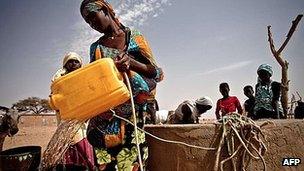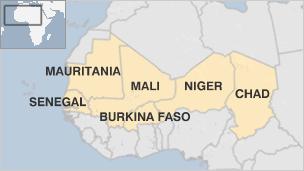UK announces extra £10m drought aid for West Africa
- Published

The Sahel region has been badly affected by drought
An additional £10m ($15m) will be provided by the UK for countries in West Africa facing the threat of drought, the government has announced.
Estimates suggest 1.5 million children in the Sahel region face starvation.
International Development Secretary Andrew Mitchell urged other nations to follow the example of the UK, which has already committed £10m to the crisis.
"Britain will not sit back while children starve to death in the Sahel," he added.
In January, Oxfam and Save the Children said thousands of people in East Africa died needlessly from famine last year because the international community failed to heed early warnings.
Mr Mitchell urged his counterparts around the world to take action against the latest threat.
Tools and seeds
He said: "We took a lead in tackling the food crisis in East Africa and now is the time for others in the international community to step up."
The Department for International Development (DfID) said action was needed before the rainy season made large areas of West Africa inaccessible for aid workers in as little as four weeks' time.
It said latest support would fund nutritional treatment, health, water and sanitation for a further 31,000 children, and food for a further 170,000 people for six months.

The package will also provide animal feed and vaccinations to keep more than 280,000 farmers' livestock alive, as well as tools and seeds for 470,000 families.
According to DfID, a combination of conflict and poor harvests have left eight million people in need of urgent assistance and a further 10 million requiring additional support.
Oxfam has launched a £23m ($36m) emergency appeal to help reach more than a million of the most vulnerable in West Africa.
In March, the charity said malnutrition rates across Chad, Burkina Faso, Mali, Mauritania, Niger and northern Senegal were hovering at between 10% and 15%, and in some areas had risen beyond the emergency threshold level of 15%.
In parts of Chad, Oxfam says, some villagers have been digging up ant hills to gather grain that the ants have stored.
The charity says drought, high food prices, severe poverty and regional conflict are causing the crisis.
Recent fighting between rebels and the army in northern Mali has caused more than 100,000 people to flee their homes - half of them crossing into Niger and other countries that are already hard-pressed.
- Published9 March 2012
- Published18 January 2012
- Published18 January 2012
- Published18 November 2011